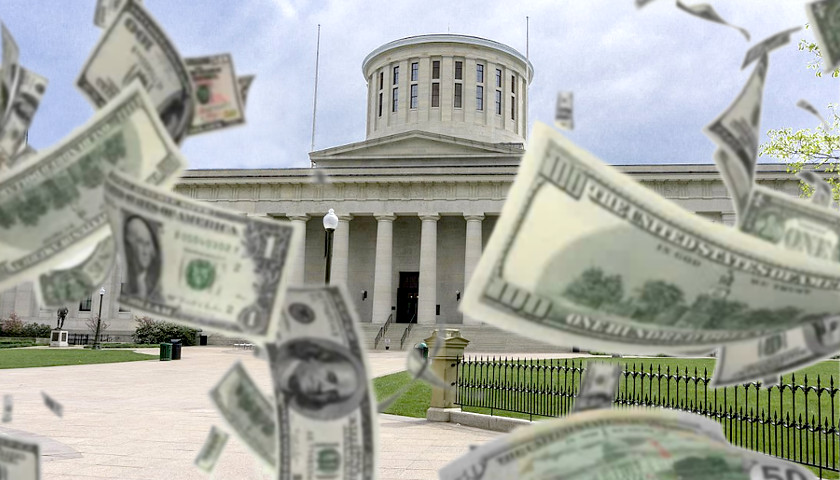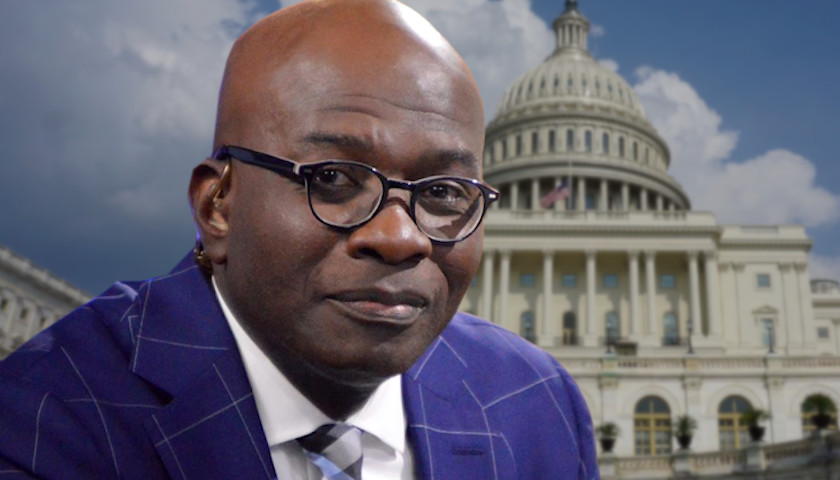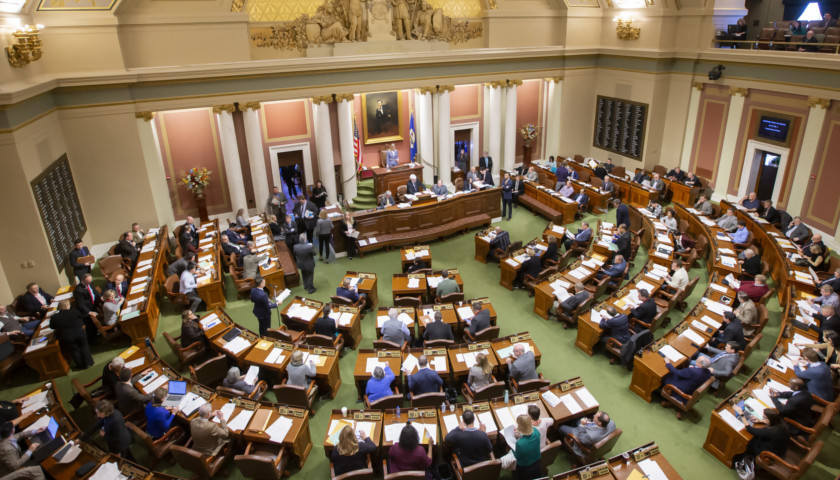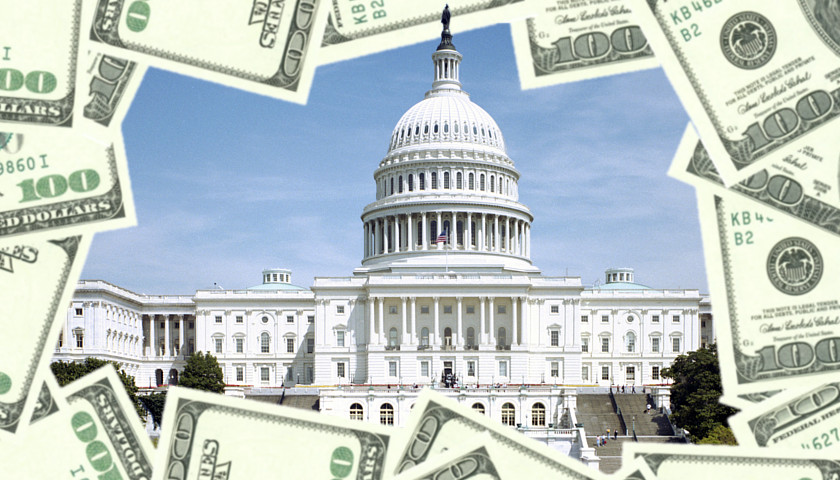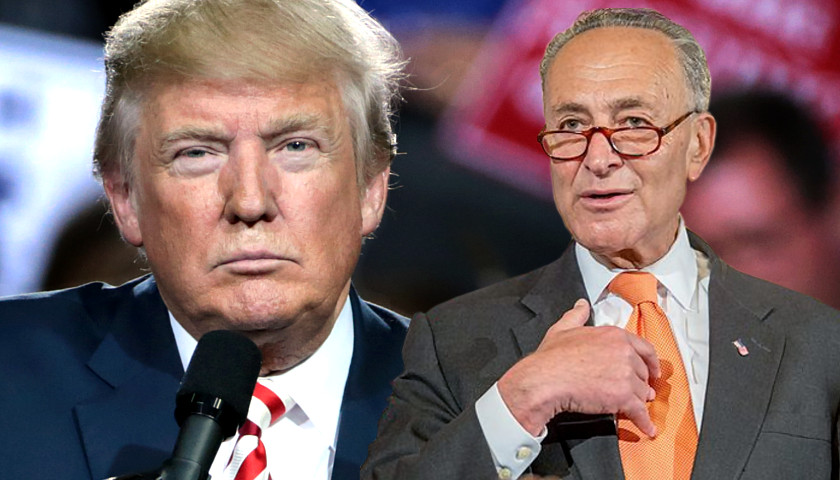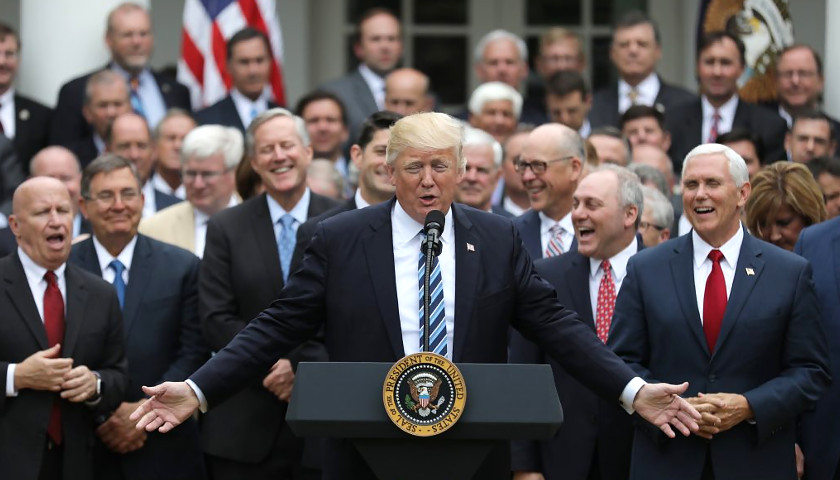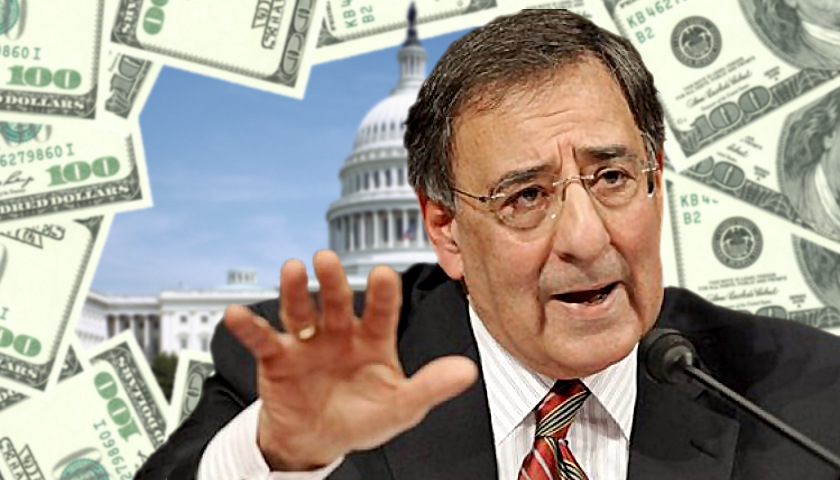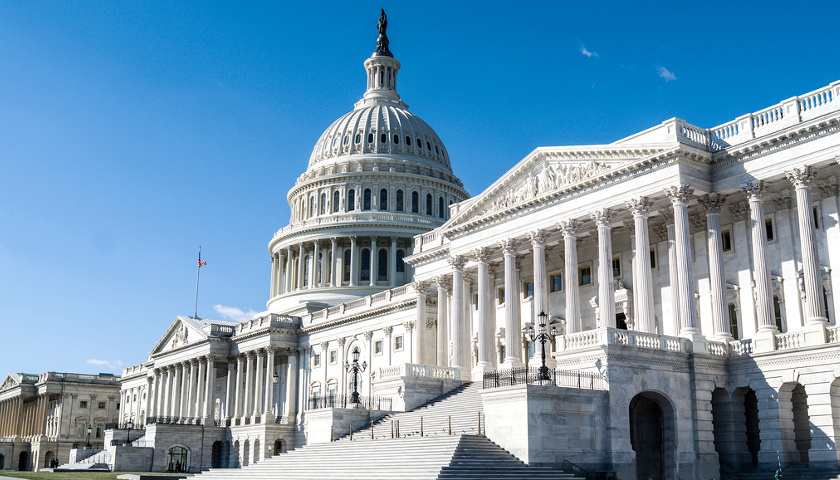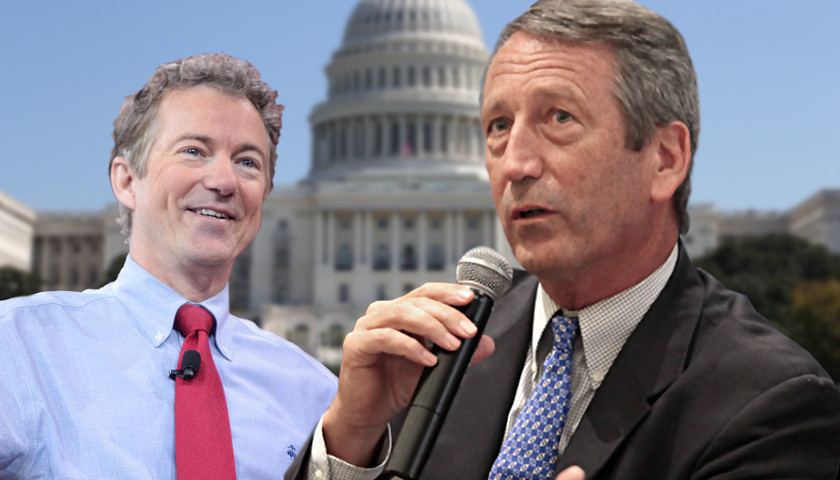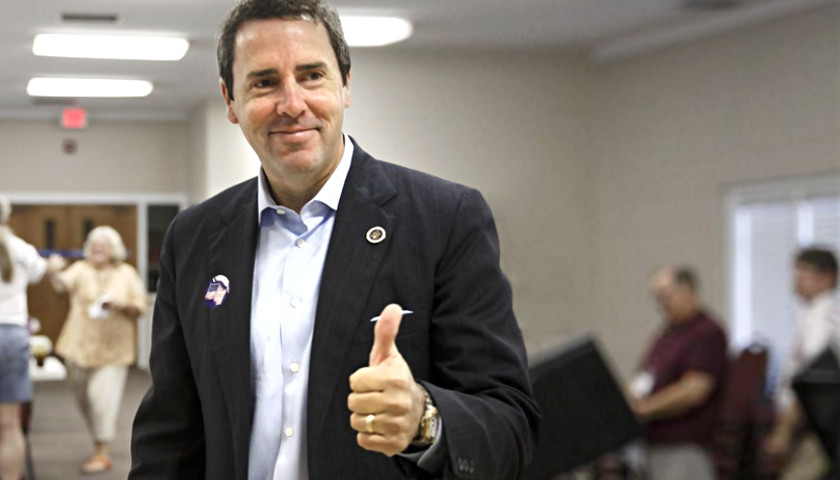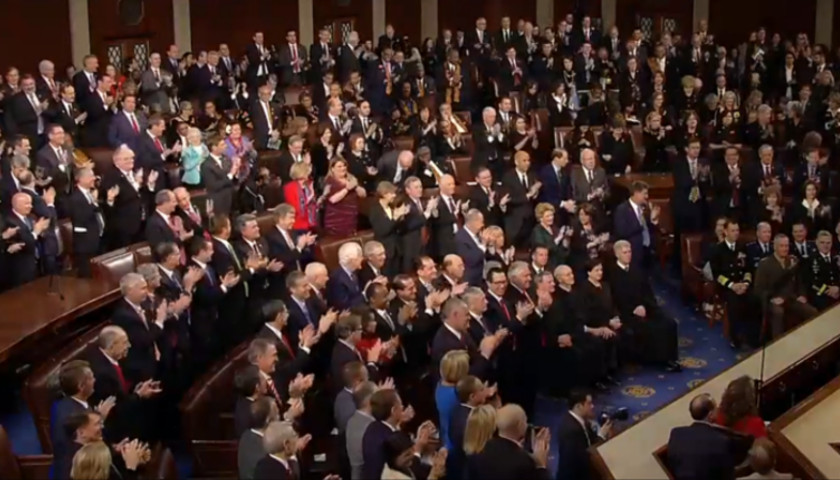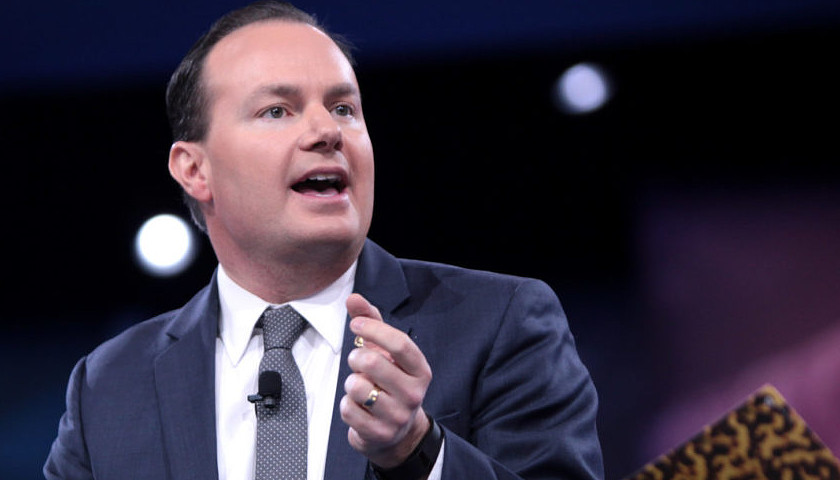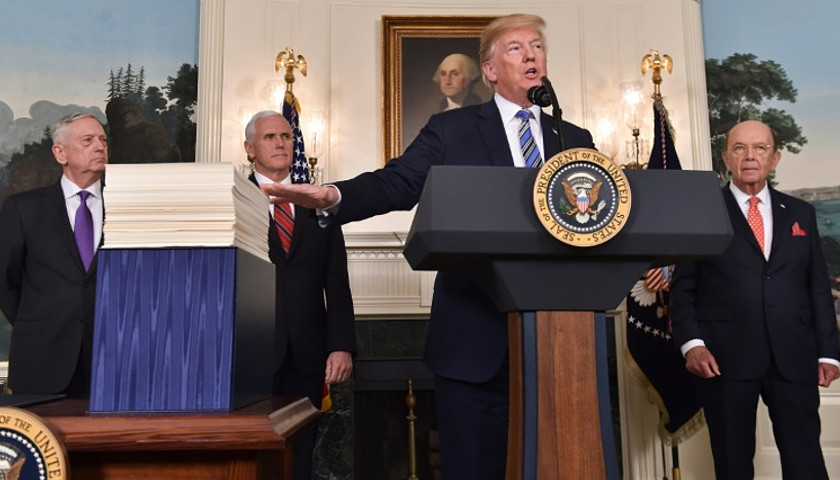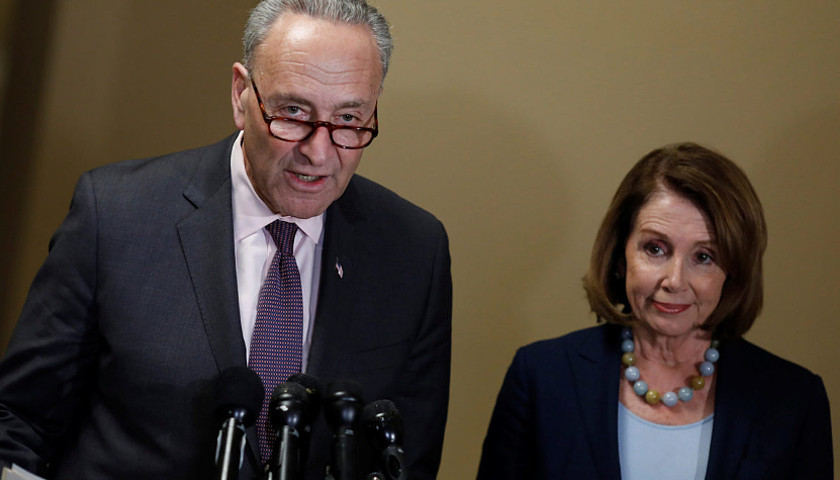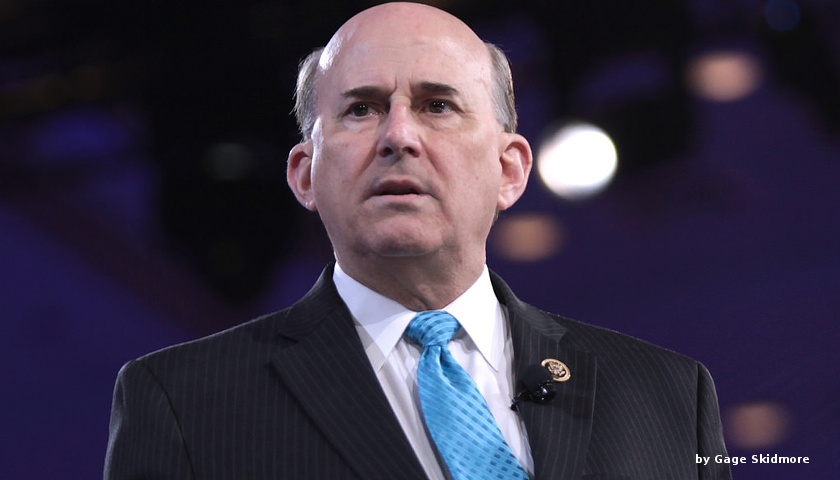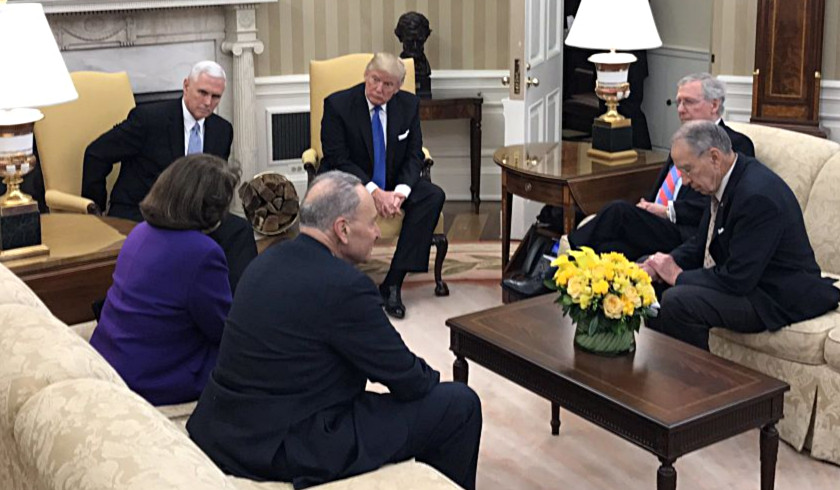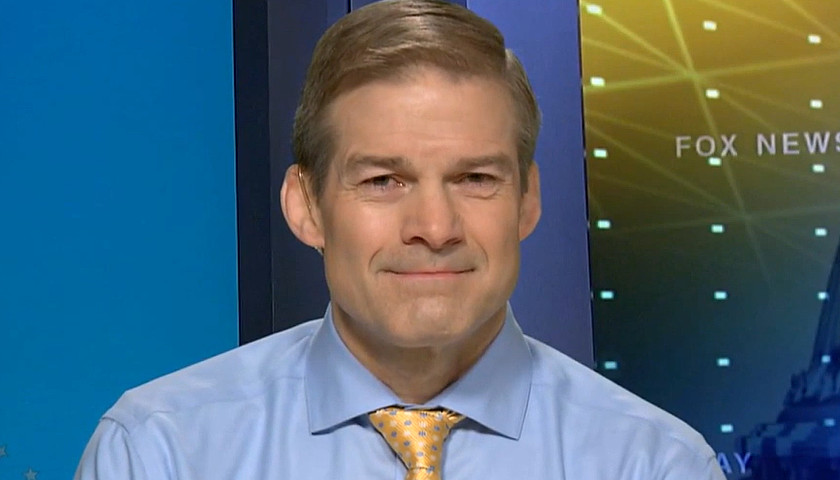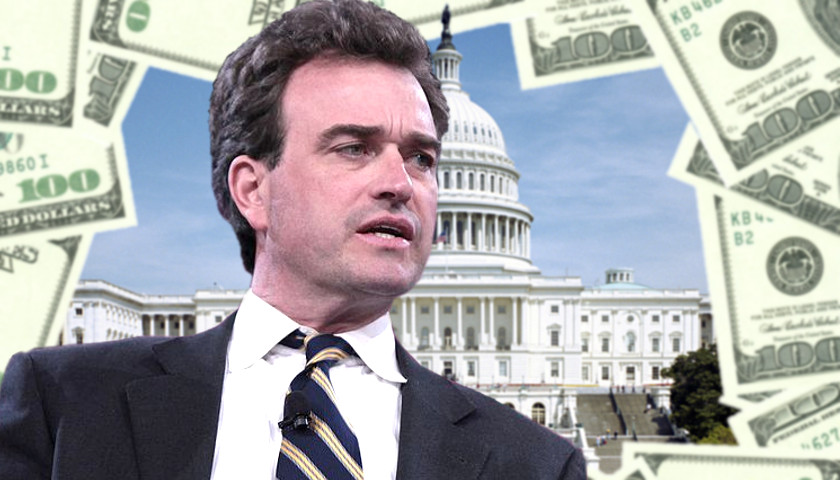The Buckeye Institute has slammed the newly released Ohio budget for excess spending, saying that while it commends the governor for balancing the budget, the state missed an opportunity for reform.
Read the full storyTag: spending
Ohio Governor Orders Millions More in Cuts to State Agencies
Saying immediate actions are necessary to keep the state’s budget balanced, Ohio Gov. Mike DeWine ordered hundreds of millions of dollars in cuts to state agencies.
“In the springtime, the impact of the COVID-19 pandemic on the global economy, and Ohio’s revenue, was dire. With this, reductions were made to the state biennial budget,” DeWine said. “With this executive order, we are finalizing current year budget reductions at $390 million across all agencies, which is less than the cuts implemented last year.”
Read the full storyNew House Rules Carve-Out for ‘Climate Change’ Bills Exempted from Requiring Projected Price Tag
House Democrats blocked a Republican attempt on Monday to require any proposed climate change legislation to also include its projected cost.
Under the Pay As You Go (PAYGO) rule, any additional government spending proposed must be accompanied by tax increases or separate cuts. After a push from several lawmakers in the Democratic Party’s progressive wing, however, the rules package for the 117th Congress states PAYGO will not apply to legislation relating to the necessary economic recovery or U.S. efforts to combat climate change.
Read the full storyOhio Ends 2020 Fiscal Year with General Tax Revenue Down $1.1 Billion
Ohio concluded the 2020 fiscal year with General Revenue Fund tax revenues of $1.1 billion, or 4.6 percent, below estimates, a clear indication of the impact the COVID-19 restrictions have had on the state.
Tax revenues in June were $50.5 million, or 2.2 percent, below estimate. However, state officials noted that revenues were better than a month earlier when they were 13 percent below expectations.
Read the full storyArmstrong Williams Commentary: It’s Time to Talk About Recession
Is America in a recession? It’s an unpopular question to ask, but it has now been over 3 months since COVID-19 restrictions were initiated and it is time for us to get realistic about where we are economically so that we can take the proper steps to minimize further damage to our economy. At this point, the unfortunate reality is that regardless of what we do, it is likely that it will take at least several years to see a partial recovery of economic loss and the time that it will take for a complete recovery remains unknown at this point.
Read the full storyMinnesota’s Legislative Deadline Passes with No Agreement on Infrastructure Proposal
The Minnesota legislature failed to reach agreements on a major construction bill, tax relief, or state employee contracts before the midnight Sunday deadline for this session.
The lawmakers could still find a middle ground in a special June session.
Minnesota House Republicans Saturday blocked Democrat’s $2 billion bonding bill. Bonding bills must originate in the House and require a three-fifths majority, or 81 votes, to pass. The final tally fell six votes short.
Read the full storyMinnesota House Falls Short of Passing Mammoth $2.5 Billion Infrastructure Package
A two-and-a-half billion dollar infrastructure spending package – touted as a top priority for 2020 by the DFL-controlled Minnesota House – fell short of the necessary three-fifths supermajority of votes needed Saturday.
With a final count of 75-58 along party lines the measure missed by a scant six votes.
Read the full storyWhitmer Creates COVID-19 Spending Oversight Office, Approves $150 Million in Coronavirus Spending
Gov. Gretchen Whitmer created the Michigan COVID-19 Office of Accountability on Monday to provide a check over spending during the coronavirus pandemic.
The office, which resides in the State Budget Office, provides oversight to all spending to fight the coronavirus and will report to the governor and the state budget director.
The Department of Technology, Management and Budget will designate a chief for the office.
Read the full storyMichigan to Face More Budget Cuts as Tax Revenues Plummet
A storm of skyrocketing unemployment paired with plummeting tax revenue have plunged the state budget into a multi-billion dollar deficit.
State Budget Office Communications Director Kurt Weiss told The Center Square in an email that tax revenues for this fiscal year are projected to drop between $1 billion and $3 billion.
There’s another $1 billion to $4 billion projected for Michigan’s next fiscal year, Weiss said.
Over 1 million people have filed for unemployment benefits, more than a quarter of the state’s workforce.
Read the full storyCommentary: Alexis de Tocqueville’s Lessons in a Time of Pandemic
The immediate challenge of COVID-19 has been cast as an examination of how individual Americans will fare should they be exposed to the virus. The effort to arrest the spread of the virus has brought unprecedented changes in the daily routines of all Americans. The limitation of activity is apparent when one walks outside. There is a marked silence, regardless of the time of day, almost eerie, that gives one pause.
The check on movement is accompanied by images of field hospitals and graphs showing curves and spreads displayed across news sites. While many are changing their daily routines to comply with the requirements of staying at home and practicing social distancing, a broader concern is the effect on our American democratic foundation.
Read the full storyCommentary: The U.S. Economy Will Weather the Chinese Coronavirus
President Donald Trump praised the Federal Reserve for cutting the federal funds rate to a range of 0 percent to 0.25 percent, and restarting quantitative easing with $500 billion of U.S. treasuries purchases and $200 billion of mortgage purchases in response to the Chinese coronavirus global pandemic.
“It makes me very happy and I want to congratulate the Federal Reserve,” he said. “That’s a big step and I’m very happy they did it.” Trump has been hounding the Fed for years to cut interest rates to make the dollar more competitive against trading partners’ currencies including the yuan, euro and peso. Now he gets his wish.
Read the full storyOne Aspect of Trump’s New Budget Proposal Targets Waste, Fraud: Report
One initiative in President Donald Trump’s fiscal 2021 budget, to be presented to Congress Monday, targets waste, fraud and abuse of taxpayer money.
Read the full storyStates Across the Boards Plan to Increase Spending in Fiscal 2020
State lawmakers nationwide are spending more money, but they are also replenishing rainy day funds in preparation for the next economic downturn, a new report determined.
Read the full storyReport: Government Wasted $230 Million on Failed Programs
The U.S. government spent $33.9 million of taxpayer money on unused textbooks for Afghani children. The books are still sitting in decaying storage units in Afghanistan. American taxpayers also spent $16 million to improve the quality of Egyptian education.
Read the full storyAudit: Dead People Have Been Collecting Billions From Social Security as It Goes Bankrupt
Every year, the Office of the Inspector General (OIG) audits the Social Security Administration (SSA) and publishes its findings.
Read the full storyCommentary: Skyrocketing Debt Too Important to Be Paired With Spending Deal
by Justin Bogie Two major issues that Congress will be forced to confront in the coming weeks and months are the debt limit and the future of the Budget Control Act discretionary spending caps. A report from The Hill indicates that negotiations are underway between Congress and the Trump administration to combine a two-year budget caps deal with an increase or suspension of the debt limit. Taxpayers have seen this failed approach before. For lawmakers, pairing an unpopular action, like raising the debt limit, with massive spending increases sweetens the deal. The total national debt is more than $22 trillion. An unpaid for budget deal could add at least another $2 trillion. Congress should debate the debt limit and new spending thoroughly and separately. Importantly, lawmakers must not make the fiscal situation any worse. As of May 17, the debt subject to the limit was $21.9 trillion and just $25 million short of eclipsing the limit. In total, the Treasury estimates that the national debt has increased by more half a billion dollars since Oct. 1. For the time being there is no immediate risk that the federal government will have to stop making payments or providing services. The…
Read the full storyLawmakers Eye a Huge Backdoor Spending Increase
by David Ditch Members of Congress are promoting the concept of changing three programs from the discretionary category (requiring annual appropriations) into mandatory (auto-pilot) spending. Such changes would become a huge backdoor spending increase. Spending limits have come under relentless attack from both parties. In 2013, 2015, and 2018, Congress passed massive spending increases with little to no effort to find pay-fors. With just two years remaining for the Budget Control Act’s modest restraints, there is tacit agreement that Congress will likely make yet another deal to add to the nation’s $22 trillion debt. If that was not bad enough, there is a long, bipartisan tradition of finding shortcuts around already-inflated spending limits. Appropriators have repeatedly used fake savings to squeeze more spending inside the caps. Disaster and war funding exceptions have been abused to the tune of hundreds of billions of dollars. Congress has accepted flagrant violations of budget rules with minimal resistance. Another tactic for avoiding budget discipline is to re-categorize existing programs. While discretionary spending is subject to limits and annual deliberation, so-called mandatory spending is typically left to grow unchecked. The liberal Left continue to push their radical agenda against American values. The good news is there is a solution. Find out more >> Mandatory spending—which…
Read the full storyRick Manning Commentary: President Trump Versus Washington’s Spending and the Constituencies Who Fight for Them
by Rick Manning In Washington, D.C., every spending program and tax break has a constituency that fights for it. This is why they exist, because somewhere, someone believes that Warren Buffett needs a wind production tax credit, and that opera programming should be taxpayer funded. These constituencies are tightly organized and connected into the D.C. power centers to continue and if possible expand the favored spending. Do you know who doesn’t have a well-funded lobbying arm? Why, it is the actual taxpayers and limited government conservatives who fight against the tide of the ever expanding government. Groups like Americans for Limited Government, which I head, depend upon the raw power of truth to stand up to the D.C. government growth machine, and the election of Donald Trump to the presidency shows that winning is possible. In spite of growing deficits, the Trump presidency gives us reason for hope that fiscal sanity may be restored, as for the third year in a row, they have released a budget which provides a pathway to balance. While the fifteen-year time frame may seem like a long time, by comparison, so-called budget cutter Paul Ryan’s proposals often had a four-decade timeline to reach balance.…
Read the full storyDeWine’s First State of the State Address Focuses on Long Term Plans for Ohio
COLUMBUS, Ohio– Tuesday, Ohio Republican Governor Mike DeWine addressed a joint session of the Ohio legislature in his first State of the State Address. While he covered several topics ranging from workforce development to infrastructure repair, the speech’s main focus was three key points; the gas tax, greater protections for children, and environmental action. Prior to his remarks, DeWine was asked what, specifically, he would address. He did not mention the raising gas tax. However, almost half of the speech he gave focused directly or indirectly on the necessity of doing just that. He stated: These are the essential facts: Our counties, cities, villages, and townships have seen their resources for road and bridge repairs dwindle and dwindle over the years. A dollar of gas tax in 2005—the last time the gas tax was raised—now only buys 58 cents worth of road and bridge repairs. And our local partners—townships, villages, cities, and counties—have received no relief for 14 years. Each year, their infrastructure degrades more and more. Each year, they fall further and further behind. And each year, their roads and bridges get less and less safe…by requesting $1.2 billion dollars to fill the budget hole and meet existing needs, let me assure you…
Read the full storyPresident Trump’s Executive Order Freezing Federal Pay Saves Taxpayers from Double-Digit Pay Increases
by Rachel Greszler President Donald Trump issued an executive order effectively freezing federal pay for 2019 at current 2018 levels. Had the president not issued this executive order (and lacking congressional action on federal pay), federal workers would have received a 2.1 percent across-the-board pay increase, as well as a 25 percent increase in locality-based pay. A 2.1 percent across-the-board increase would have cost roughly $5 billion in 2019 while the locality-based increase would have cost a reported $26 billion. That exceptional pay spike would have kicked in had the president not acted and had the default changes specified in the 1990 Federal Employees Pay Comparability Act kicked in instead. That act provides for annual federal pay increases based on the Bureau of Labor Statistics’ Employment Cost Index, which tracks civilian employment costs. [ The liberal Left continue to push their radical agenda against American values. The good news is there is a solution. Find out more ] Despite the specified formulaic federal pay increases, federal pay has more recently been set by presidents through their authority to propose an alternative pay schedule. As has become the norm in recent decades, presidents typically set their own pay proposal by Aug. 31 and barring alternative congressional action…
Read the full storyChuck Schumer Demands Climate Concessions From Trump on Infrastructure Spending
by Michael Bastach Senate Minority Leader Chuck Schumer told President Donald Trump that Democrats won’t cut a deal with him on infrastructure spending unless it includes a slew of policies aimed at fighting global warming. Schumer, the Senate’s top Democrat, called for, among other things, making green energy and electric vehicle tax credits permanent, more research funding into green technology and funding to harden infrastructure against extreme weather. “The impacts will continue to worsen if we do not take decisive and immediate action to transition to a 100-percent clean energy economy,” Schumer wrote in a letter to Trump sent Thursday. Both Trump and Democrats proposed $1 trillion infrastructure packages, but Democrats also want to make an infrastructure build-up about fighting global warming. “A single infrastructure bill will not solve our climate problem in its entirety, but it is an important first step,” Schumer wrote to Trump, also giving a list of demands for any infrastructure plan. Schumer’s letter, and accompanying Washington Post op-ed, come as Democrats push for global warming to become a central focus of 2019. A small, but growing, cadre of Democrats led by Rep.-elect Alexandria Ocasio-Cortez of New York want “Green New Deal” legislation to rapidly force the U.S. to use…
Read the full storyCommentary: Only Two Weeks Left for Republicans to Get It
by Rachel Bovard There’s only one area where bipartisanship still reigns in Washington: avoidance. Republican and Democrat leaders this week held hands and used the funeral events for President George H. W. Bush as an excuse to move their funding deadline—which previously expired on December 7—two weeks forward, to December 21, four days before Christmas. In doing this, Congress isn’t getting festive. Rather, backing up a government funding deadline dangerously close to the Christmas holiday is an old political tactic, designed to assure passage of bloated and controversial spending bills. In the old days, the carrots in this equation were earmarks—funding pet projects of lawmakers was the way to grease the skids on controversial bills. But now that earmarks have been banned (in theory, anyway), the only option left is a stick: threatening lawmakers with chaos, missed Christmas holidays and a government shutdown, unless they instantly (and many times, without reading) pass whatever bill their leaders cook up. This is a vexing development for conservatives, particularly when it comes to the big will-they-won’t-they question circulating around Washington: the fate of Trump’s border wall. If GOP leaders are already willing to waste critical weeks in the waning days of their majority, what…
Read the full storyREPORT: EPA Paid $14.5 Million For Foreign Nationals, Not Americans, To Work In Government Labs
by Michael Bastach The Environmental Protection Agency (EPA) paid $14.5 million to foreign nationals to work at agency laboratories over the past 11 years that could have been awarded to U.S. citizens and permanent residents, according to federal investigators. EPA’s Office of Inspector General (OIG) found the agency’s cooperative agreement with the National Academy of Sciences (NAS) funded 107 fellowships to “foreign nationals or persons who were not citizens or permanent residents of the United States.” “Allowing foreign nationals to participate in the fellowships is inconsistent with the EPA practice of awarding fellowships to U.S. citizens, which is required for the EPA’s directly awarded fellowships,” OIG reported Wednesday. EPA’s cooperative agreement with NAS began in 2007 and lasted until 2017, so it spanned multiple administrations. In that time, EPA has come under criticism for wasting taxpayers dollars. Federal auditors found in 2014 that eight EPA employees racked up 20,926 hours on paid leave “and cost the government an estimated $1,096,868.” Each “was on extended administrative leave for four or more months,” auditors found. The Government Accountability Office noted in a 2014 report the “salary cost for EPA employees on administrative leave for fiscal years (FYs) 2011 through 2013 was $17,550,100.” Most notably, former…
Read the full storyDeceptive Tricks Congress Uses to Drive Spending Higher
by Justin Bogie Congress is up to its old tricks again, trying to pass another massive spending bill that uses gimmicks and tricks to push deficit spending even higher. And it thinks it can hoodwink President Donald Trump into signing it. Next week, the House is expected to vote on a combined fiscal year 2018 continuing resolution and a fiscal year 2019 spending bill for the departments of Defense, Labor, and Health and Human Services. The “cromnibus” bill would provide over $855 billion in funding for 2019, making up two-thirds of the total discretionary budget. The Senate passed the measure on Tuesday. If the House passes the Senate version and the president signs it into law, the government will stay open past Sept. 30. But at what cost? Earlier this year, Congress busted the budget and with a whopping spending deal that ran up nearly $300 billion in new debt. This bill would continue those spending levels. Take the so-called savings from changes in mandatory programs. The bill claims nearly $8 billion in savings from such changes. This is the most commonly used gimmick to increase discretionary spending. These “savings” are included in appropriations bills as a rescission of funds, meaning that unspent money…
Read the full storyWith the End of the Fiscal Year September 30, Congress Is Running Out of Time to Fund ‘The Wall’
By Robert Romano The 2018 fiscal year will end on Sept. 30 but Congress is no closer to achieving key Trump administration priorities including fully funding the southern border wall, something President Donald Trump has been demanding since 2017 and campaigned on extensively in 2016. So far, both the House and the Senate have passed appropriations bills for Defense, Energy & Water, Interior, Agriculture, Financial Services, Transportation and Housing and Urban Development, Legislative Branch and Military/Veterans. But so far, no wall. Of those, Energy & Water, Legislative Branch and Military/Veterans have been consolidated into a single bill, H.R. 5895, which is now in conference between the House and Senate. And Interior, Agriculture, Financial Services and Transportation and Housing and Urban Development have been consolidated into H.R. 6147. Everything else, including Commerce/Justice/Science, Homeland Security (which includes the wall), Labor/HHS/Education and State/Foreign Operations that have not already passed both chambers are likely to be wrapped up in a continuing resolution at the end of this month. On one hand, that can be a good thing — or at least a not bad thing —insofar as it gives Congress a little bit more of an opportunity to get those things right. For example, the Labor-HHS…
Read the full storyThree Budget ‘Reforms’ That Would Make Matters Worse, Not Better
by Dody Eid and Romina Boccia A congressional select committee on reforming the budget process recently held another public hearing, supposedly with the ultimate aim of designing a more transparent, accountable, and responsible budgetary process. Any such changes should also re-establish and enhance Congress’ power of the purse. But if those are the goals of the Joint Select Committee on Budget and Appropriations Process Reform, it is badly missing the mark by repeatedly discussing only three proposals. They are unlikely to be much of an improvement—and could make matters even worse, if that’s possible: biennial budgeting, earmarks, and moving from a fiscal year to a calendar year. Biennial budgeting: Among the proposals considered by the committee, one that is gaining traction is biennial budgeting. That would relieve Congress of the obligation to submit a budget resolution each year. Instead, it would only prepare a budget every two years. Proponents contend that such a change gives the legislative branch more time to dive deeper on the issues presented by the growing budgeting challenge, to provide more oversight of the executive, and to reduce budget dysfunction as fiscal year deadlines approach. At the July 12 hearing, former Defense Secretary Leon Panetta, who served early in…
Read the full storyCommentary: Trump, Reagan, and Big Government
by Jeffery Rendall As I strolled through the excellent and memory-provoking exhibits at the Ronald Reagan Presidential Library (in Simi Valley, CA) the other day I was struck by how similar President Donald Trump’s approach to today’s politics is to the way Ronald Reagan handled the subject a half century ago. For starters, Reagan and Trump’s optimistic pro-American emphasis is nearly identical. They both appealed to the patriotic propensities of country-loving individuals to rise up and be the best they possibly can be, so that everyone might achieve their goals and dreams as long as they’re willing to work hard, sacrifice and put stock in the best nation on the planet. At their core both Reagan and Trump mastered a populist message and used it to ignite a movement (unfortunately in their cases, very personality-centered). Both acknowledged America as the lead source of good in the world and championed American exceptionalism as their signature value. Both were extremely media savvy and understood mass communications and messaging to perfection. It almost appears as though Trump’s emulated Reagan’s political career and added his own personal touches to match the legendary effectiveness of the great communicator. Reagan didn’t have Twitter, of course, and…
Read the full story‘Pig Book’ Spotlights 232 Earmarks Amid Pork That Wastes Taxpayers’ Money
by Katherine Rohloff All but a relative few farmers and other rural residents have had electricity and telephone service for a generation, but the U.S. government devoted $10 million in the current budget to a duplicative Rural Utilities Service program designed to help pay for energy costs. Taxpayers continue to finance the program even though then-President Barack Obama tried to eliminate the High Energy Costs Program in 2013 because it duplicated the U.S. Electric Loan Program. The program buried in the Agriculture Department budget is brought to the surface in the “2018 Congressional Pig Book” compiled by Citizens Against Government Waste, a watchdog that has put together the catalog of pork, earmarks, and other questionable federal spending since 1991. “Earmark spending, deficits, and debt all grow when the lights are turned off—all grow when attention is focused somewhere else,” Sen. Ted Cruz, R-Texas, said Wednesday at the organization’s press conference announcing the new edition. “What earmark spending, deficits, and debt loathe more than anything is sunshine, is being revealed,” Cruz said. “Because that sunshine has a disinfectant effect.” The 2018 #PigBook has been released! Find out why this little pink book makes Washington squirm… https://t.co/Fiwzzvv0w6 — Citizens Against Government Waste (@GovWaste) July 18, 2018 The 2018…
Read the full storyCommentary: The Ticking Fiscal Time Bomb Set in 1937 Could Tip America Into Despotism by 2030
by Robert Osburn Celebrated this past July 4, America’s founding story of freedom is truly remarkable: unity, courage, integrity, and national integration (incorporating people from around the world). In most other places, the freedom story is bloody, exclusive, and, ultimately, tyrannical. Take Nicaragua, for one example: In 1979, the Sandinistas overthrew dictator Anastasio Somoza. Nearly four decades later, hundreds are dying because the very people who led the Sandinista revolution (Daniel Ortega and friends, now in power) are behaving exactly like Somoza. It’s déjà vu all over again for our Central American neighbors. In an age when democracy is clearly retreating, will America eventually succumb to autocracy while waving sayonara to democracy? It’s a question that National Review’s JonahGoldberg once very handily dismissed. He now admits that American totalitarianism is a real possibility. Utilizing a scenario-building skill that I learned during my doctoral studies, let me offer what I consider a very plausible scenario that takes America down the rathole of tyranny: Sometime between 2028 and 2034, America’s president will use executive or emergency powers to solve the nation’s Social Security trust fund crisis. As Americans celebrate that presidential act of courage, we will begin the long road to tyranny because we cannot rule ourselves. Does this remind anyone of the books of Judges and I Samuel when, because everyone did what was right…
Read the full storyThe Social Security and Medicare Trust Funds Are Nearly Depleted
By Robert Romano 2026. That is when the Medicare Hospital Insurance trust fund will be depleted, according to the Board of Trustees for the Federal Hospital Insurance and Federal Supplementary Medical Insurance Trust Funds. That is down from 2029. After that, the share of benefits paid for by revenues will drop until 2039, when payroll taxes will only be enough to pay 78 percent of benefits. Then, benefits would rise to 85 percent by 2092. The most obvious culprit is the Medicare Access and CHIP Reauthorization Act of 2015, which overwhelmingly passed Congress and which former President Barack Obama signed into law. That was the bill that ended the sustainable growth rate that had been the centerpiece reform of the GOP Congress and President Bill Clinton in the late 1990s to balance the budget. The sustainable growth rate was a 1997 reform intended to put the failing program on a sustainable footing before its trust fund was exhausted. Before passage of the 2015 repeal, which sent costs spiraling out of control, the draining of the Medicare trust fund was said to have been in 2030. Then it dropped to 2029 and then to 2026. To be fair, even if the bill had not passed, the trust…
Read the full storySenate Fails to Pass the Rescission Package
By Printus LeBlanc When President Donald Trump signed the omnibus spending bill back in March, he did so reluctantly. The swamp knew the President’s feelings for the military and hid behind them to fill the omnibus with wasteful spending. The President signed it, hoping some of the spending would be later rescinded. After all, who on Capitol Hill wants to fund programs that do nothing and waste money. The President and the American people got their answer when the Senate continued to do what it does best, disappoint the taxpayers. It is bad enough the House barely passed its modest $15 billion rescission package, but the Senate failing to pass the measure is downright embarrassing. The bill failed 48-50 with two Republicans voting to continue wasting money on government programs that don’t do anything. One has to wonder why Senators Richard Burr (R-N.C.) and Susan Collins (R-Maine) crossed the aisle to vote with hardline progressives to fund programs that do nothing? What about Sen. Joe Manchin (D-W.Va.)? Doesn’t he claim to be a fiscal conservative? One of the most aggravating examples of government waste is the Advanced Technology Vehicles Manufacturing Loan Program. The program provides taxpayer-funded loans to automobile and automobile part…
Read the full storyTrump’s ‘Rescission’ Package Would Save Unspent Tax Dollars
by Justin Bogie President Donald Trump on Tuesday submitted a special message to Congress requesting that $15 billion in unspent funding be rescinded. That’s a good first step toward re-establishing fiscal responsibility. Congress should embrace it and quickly adopt the president’s rescission package. Still, the package does nothing to claw back the tens of billions of additional dollars in wasteful spending authorized by the 2018 Omnibus Appropriations Act. Nor is it the answer to the nation’s long-term debt problem. Congress and the president should work together on additional rescission packages that target 2018 spending and pass a fiscal year 2019 budget that rolls back the latest budget deal and addresses the programs driving the national debt. [ The liberal Left continue to push their radical agenda against American values. The good news is there is a solution. Find out more ] The president’s rescission package would take back $15 billion in previously provided spending authority. Of that, $7 billion would come from funds provided in 2017 to the Children’s Health Insurance Program, also known as CHIP. No authority was ever actually granted to CHIP to spend that money. The obvious question: If the money was never going to be spent anyway, then how is it “saving” taxpayers money…
Read the full story‘Penny Plan’ Puts the Spotlight on Out-of-Control Federal Spending
by Romina Boccia Sen. Rand Paul, R-Ky., and Rep. Mark Sanford, R-S.C., recently revived the “penny plan,” which calls on Congress to reduce spending by at least one penny on the dollar from one year to the next. The proposal was introduced in 2011 by then-Rep. Connie Mack, R-Fla., and Sen. Mike Enzi, R-Wyo., and has been introduced several times since then. Sounds easy, no? The Paul and Sanford proposals highlight an issue that is becoming more severe every year. Yet, there’s more to the story. [ The liberal Left continue to push their radical agenda against American values. The good news is there is a solution. Find out more ] The penny plan is appealing for a few reasons. It’s simple. While budget discussions in Washington can be very complex and hard to follow for most people, the penny plan is easy to understand. It would simply reduce spending by 1 percent. Just about any American can support the idea that the federal budget can probably make do with 1 percent less in spending. The plan’s simplicity hides the actual spending reductions required to make it work. It appears to work. The plan would reduce federal spending sufficiently to balance the budget in…
Read the full storyExclusive: Conservative Lawmakers’ Blueprint Would Trim Nondefense Spending, Balance Budget in 8 Years
by Rachel del Guidice House conservatives propose to cut nondefense spending and balance the federal budget within eight years in a blueprint released Wednesday. The document produced by the Republican Study Committee, the largest caucus of GOP lawmakers in the House, includes a long list of policy goals such as repealing Obamacare, restoring power to states, making tax cuts “permanent,” reforming welfare programs, and “saving” Social Security and Medicare. The 169-page blueprint, called “A Framework for Unified Conservatism,” proposes to cut government spending by more than $12.4 trillion over the next 10 years, compared with current law. “I am very hopeful, when it comes to the legitimacy of this, if we are ever going to talk about the expectation of the federal government to live within its means, here’s the framework, this is the blueprint,” Rep. Mark Walker, R-N.C., chairman of the 150-member caucus, said Tuesday during a press briefing. [ The liberal Left continue to push their radical agenda against American values. The good news is there is a solution. Find out more ] “I don’t believe for one second that everything can be immediately instituted,” Walker told reporters, but “our job … is to put together some kind of blueprint, the framework…
Read the full storyBudget Director Mick Mulvaney Says He Will Ask Congress to Cut Spending in ‘Coming Weeks’
by Rachel del Guidice Office of Management and Budget Director Mick Mulvaney says his staff will soon be sending a package to Congress to rescind some of the planned spending in the $1.3 trillion omnibus bill signed last month by President Donald Trump. “[We] hope to have something here in the next couple weeks,” Mulvaney saidWednesday during a House appropriations subcommittee meeting, reports The Washington Times. Conservative lawmakers, such as Rep. Dave Brat, R-Va., want Trump to send a rescission request to Congress to cancel nondefense spending that the legislators previously approved in the 2,000-plus-page omnibus bill. “We need a plan right now, where the White House and then the House leadership both say, ‘Look Mitch, there’s plenty of money just sitting around in pots, where we can buy significant savings for the American people after that omni[bus], and we want to show them we are serious about fiscal responsibility,’ and so that’s what it is going to take,” Brat told The Daily Signal in a phone interview Thursday. [The liberal Left continue to push their radical agenda against American values. The good news is there is a solution. Find out more ] Senate Majority Leader Mitch McConnell, R-Ky., said Tuesday that he does not…
Read the full storyTennessee House Votes to De-Fund Memphis ‘Bicentennial Celebration’ After the Midnight Statue Removal Debacle
Using ‘the power of the purse,’ the Tennessee House of Representatives passed an amendment by a vote of 56-31 Tuesday to de-fund Memphis’ bicentennial celebration by $250,000 as a consequence to the overnight removal of two Confederate monuments in late 2017. “If you recall, back in December, Memphis did something that removed historical markers in the city,” Tennessee Republican Rep. Steve McDaniel said from the House floor. “It was the city of Memphis that did this, and it was full knowing it was not the will of the legislature.” Memphis Mayor and City Council schemed to sell the land containing the parks and statues of Confederate President Jefferson Davis and Gen. Nathan Bedford Forrest on very favorable terms to a nonprofit which then took them down. As The Tennessee Star reported: Confederate monuments on what was until recently city property were taken down in Memphis after the sun set on Wednesday with little advance public discussion of the propriety of the actions taken secretively to circumvent state law. Whether the actions of the Memphis City Council and Mayor Jim Strickland that caused these stealth take downs of Confederate monuments Wednesday legally circumvent state law, or are in fact a brazen violation of state law, is a matter…
Read the full storyThe Little-Used, Budget-Trimming Technique Called ‘Rescissions’ Can Reduce Spending with Simple Majority Votes
By Printus LeBlanc When the President signed the budget a few weeks ago, it was obvious he was disgusted about having the sign the horrible bill. The only reason the President signed the bill was because the military was in dire straits. Those pushing the bill knew how the President felt about the military and used that against him to get the bloated bill passed. Fear not, however, there is a way the President can reduce some of the spending, while at the same time putting Congressional Democrats up for reelection on the record. The President can and should submit multiple rescissions immediately. Title X of the Congressional Budget Act of 1974 is known as the Impoundment Control Act. The act divides impoundments into two categories and establishes distinct procedures for each. A deferral delays the use of funds; a rescission is a presidential request that Congress rescind (cancel) an appropriation or another form of budget authority. To propose a rescission, the President must submit a message to Congress specifying the amount, the accounts and programs involved, the estimated fiscal and program effects, and the reasons for the rescission. Multiple rescissions may be grouped into a single message. After the…
Read the full storyOfficial Budget Forecasters Raise Debt Projections
Red ink will spill even faster over the next decade than projected as recently as last summer, the Congressional Budget Office (CBO) reported Monday. The numbers crunchers forecast that this year’s deficit will be $242 billion larger than the budget office forecast in June. The CBO attributes $194 billion of that to the tax cut Congress passed and President Donald Trump signed in December.
Read the full storyTrump Signs Law Banning Tax Dollars for Portraits of Government Officials
Remember Ed Schaefer? You should – you paid $30,500 for his hand-painted portrait. How about Steve Preston? His official government portrait cost you $19,500. But the days of taxpayers paying for oil paintings of government officials, obscure or memorable, are gone.
Read the full storyObama-Era Racial and Income Rezoning Scheme, ‘Affirmatively Furthering Fair Housing’ Defunded in Omnibus
By Robert Romano One good thing that came out of the omnibus spending bill signed into law by President Donald Trump is that it defunds a key aspect of the Obama era Department of Housing and Urban Development (HUD) regulation, Affirmatively Furthering Fair Housing. This was the rule enacted in 2015 that allowed HUD to order more than 1,200 cities and counties that accepted any part of $3 billion of annual community development block grants to rezone neighborhoods along income and racial criteria. This was always a vast overreach, where the federal government could come in and tell communities what must be built and where. Now, it’s over. Under Division L, Title II of the Consolidated Appropriations Act of 2018, Section 234, it states, “None of the funds made available by this Act may be used by the Department of Housing and Urban Development to direct a grantee to undertake specific changes to existing zoning laws as part of carrying out the final rule entitled ‘Affirmatively Furthering Fair Housing’ … or the notice entitled ‘Affirmatively Furthering Fair Housing Assessment Tool’ …” This provision utterly guts the HUD regulation, which had already been delayed by HUD Secretary Ben Carson earlier this year until 2020. Now, with the backing…
Read the full storyHere Are The Nearly 100 Republicans Who Voted Against The Spending Bill
Almost 100 Republican representatives voted against the 2,000 page omnibus spending bill Wednesday night. The House of Representatives voted to pass a $1.3 trillion spending bill in a 256 to 167 vote with seven people abstaining from voting. The spending bill offers funding to defense matter, the opioid crisis and more school safety measures.
Read the full storyHow GOP Could Avoid Kowtowing to Democrats on Budget
A $1.3 trillion spending bill passed this week by Congress has conservatives decrying a surrender of fiscal restraint and has prompted calls to eliminate the filibuster rule requiring 60 votes for most legislation in the Senate. Eliminating the filibuster would be a dramatic move that many Senate traditionalists are unwilling to make.
Read the full storyTrump Signs Spending Bill, Averting Government Shutdown
US President Donald Trump on Friday signed a $1.3 trillion compromise federal spending bill despite being “unhappy” with many of its provisions — thereby averting what would have been the third government shutdown of 2018. Trump said he signed the measure that had passed the Senate just hours earlier “as a matter of national security,” because it dramatically expands military funding and provides for “the largest pay increase” for US troops in over a decade.
Read the full storyCommentary: OmniBUST: Congress Fails to Secure Border
By Robert Romano A year late, Congress has finally approved the President’s supplemental request to begin construction of the southern border wall at $1.6 billion. The supplemental was requested in March 2017. It was supposed to be included in the May 2017 omnibus spending bill affecting spending levels for Oct. 1, 2016 through Sept. 30, 2017. This would have paved the way for the full funding for the wall being included this year. Unfortunately, it didn’t happen. Because Congress did not get started with the supplemental last year, the odds they were going to get to full funding for the wall for fiscal year 2018, that is, spending levels for Oct. 1, 2017 through Sept. 30, 2018, dropped markedly. Now those who were warning of precisely this outcome have been vindicated. This was a broken promise from the get-go. After the election, House Speaker Paul Ryan and Senate Majority Leader Mitch McConnell were promising $12 billion to $15 billion for the wall. On Jan. 27, 2017, Ryan told the American people that, “This is something, [the wall], we want to get on right away. And so we do believe this is urgent. We believe this is one of the most…
Read the full storyJubilant Democrats Toast GOP’s ‘Freddy Krueger’ Spending Nightmare
Senate Minority Leader Chuck Schumer (D-N.Y.) praised the $1.3 trillion omnibus spending bill approved Thursday by the House of Representatives — lauding Democrats’ ability to “accomplish more in the minority” than when they controlled the White House and Congress. He also proclaimed the “era of austerity” is “coming to an end.”
Read the full storyRepublicans’ $1.3 Trillion ‘Pass It to Read It’ Boondoggle
Republicans, following months of negotiations with Democrats, finally came up with an omnibus spending bill, and in a word, it “sucks.” It’s 2,232 pages of $1.3 trillion taxpayer expenditures. And lawmakers only have until Friday to pass it, or face yet another shutdown.
Read the full storySome on Right Worry Trump’s Infrastructure Plan Is a Boondoggle in the Making
President Donald Trump unveiled his plan Monday to fix what the White House describes as the “unacceptable state of disrepair” of the nation’s roads and bridges, but some experts warn it could turn into a costly and unneeded boondoggle to fix a problem that doesn’t really exist.
Read the full storyCommentary: How the Filibuster and ‘Bipartisan Consensus’ Is Spending Us Into Oblivion
By Robert Romano Say, you’re a fiscal conservative. You think the federal government is spending too much of your hard-earned tax dollars and that the $20.7 trillion national debt is pushing it. You took a gander at the campaign brochures of each of the major parties in 2016, Democrats and Republicans, and discovered Republicans were actively campaigning on balancing the budget. So, you rolled the dice and as fortune would have it, the Republicans were elected to majorities in the House and Senate plus claiming the White House for only the fourth time since the Great Depression — the other times were 1953-54 and 2003-07 when they had all three. And, at least initially in 2017, it looked like this might finally be the time spending could actually be cut. President Donald Trump offered his first budget, which proposed increasing defense spending but cutting non-defense and other mandatory spending, with a full $4.5 trillion of overall spending cuts over ten years. Fast forward a year later, and although Congress did agree to increase defense spending, it was unwilling to cut spending elsewhere. The result is $165 billion of defense spending increases and $131 billion of non-defense over the next two years. The…
Read the full storyRepresentative Jim Jordan Says the ‘Swamp Won’ on Spending Bill
Rep. Jim Jordan says the swamp struck back with the passage of a massive budget deal that increases government spending by $300 billion. “I’m saying the swamp won and the American taxpayer lost,” Mr. Jordan, co-founder of the House Freedom Caucus, said on “Fox News Sunday.”
Read the full storyCommentary: Swamp Creatures Stir to Life as Big Spending Sparks Bipartisanship
Any time you hear Washington talk about bipartisan agreement, America, grab your wallet and run! Once again, lawmakers in Washington have finally cut through all the thorny brambles of partisanship and discovered (yet again! yippie!) something they can all agree upon: spending scads and scads more of other people’s money that we don’t even have!
Read the full story
